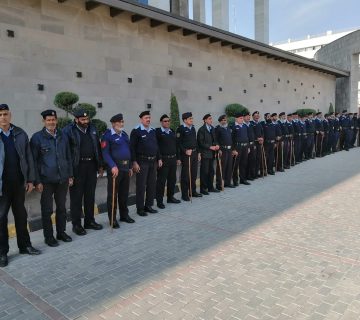KARACHI: Former military ruler General (retd) Pervez Musharraf, who had been living in Dubai since 2016, breathed his last on Sunday.
The 79-year-old former president and chief of army staff was suffering from amyloidosis, a rare disease caused by a build-up of an abnormal protein called amyloid in organs and tissues throughout the body, according to his family. The build-up of amyloid proteins (deposits) can make it difficult for the organs and tissues to work properly.
The former ruler’s illness came to light in 2018 when the All Pakistan Muslim League (APML), Musharraf’s party, announced that he was suffering from the rare disease.
He left his widow, a son, and a daughter to mourn. His body will be brought to Pakistan for burial, his family has confirmed.
The burial site remains to be confirmed but sources have said that it is likely to take place in either Islamabad or Karachi.
According to sources, a specially chartered plane will reach Dubai from Islamabad on Monday to carry the deceased home alongside his family members.
The country’s top leadership and concerned authorities are reportedly in contact with the family for the funeral preparations. Once the aggrieved family has decided on the details, a formal announcement will be made.
Expressing his deep sorrow over the news, the Chairman Joint Chiefs of Staff Committee of Pakistan (CJCSC) and Services Chiefs offered their heartfelt condolences.
“May Allah bless the departed soul and give strength to bereaved family”, read a statement issued by the ISPR — the millitary’s media wing.
A military strongman
Musharraf was born on Aug. 11, 1943, in the Indian capital New Delhi. Musharraf’s family moved to Pakistan’s southern city of Karachi after the birth of Pakistan in 1947. His father, Syed Musharrafuddin, was an accounts officer.
After joining the Pakistan Army in 1964, Musharraf went on to fight in the 1965 and 1971 Pak-India wars and was a graduate of the Army Staff and Command College, Quetta.
A retired brigadier of the Pakistan Army, Said Nazir, told Anadolu Agency that Musharraf was also the “main architect” of the Kargil war between Pakistan and India in 1999. The war took place months after then-Prime Minister Nawaz Sharif had signed a peace accord with his Indian counterpart Atal Bihari Vajpayee in Lahore.
Musharraf assumed the post of Chief Executive after imposing martial law in the country in 1999 in a bloodless coup after the then-prime minister Nawaz Sharif tried to dismiss him as army chief, having appointed him above more senior officers a year earlier. In 2002, he forced then-President Rafiq Tarar to resign and declared himself president.
The four-star general served as the president of Pakistan from 2001 to 2008. He ruled the country under the backdrop of the 9/11 attacks on the US and swiftly aligned with Washington during its military intervention in neighbouring Afghanistan.
In more than seven years in office, he oversaw a stint of economic growth while dodging at least three assassination attempts.
Musharraf won a five-year term as president in a 2002 referendum but reneged on promises to quit as army chief until late 2007.
Although he was a military dictator, he, nonetheless introduced some key reforms, including reserved seats for women and minorities, and the introduction of a powerful local bodies system and allowing a rush of news channels to dot Pakistan’s media landscape.
These reforms were retained by successive democratic governments.
His easy going charm however failed to mask the blurring of the division between the state and army, and he fell out of favour after trying to sack then-chief justice Iftikhar Chaudhry.
Remembered as the “Lawyers Movement”, a major resistance against Musharraf’s rule was triggered by the top judge’s challenge to the legality of Musharraf’s dual role as president and Army Chief. Though after massive rallies brought Chaudhry back into office on July 20, 2007, Musharraf reverted to trying to take back control of things only months later as he imposed an emergency, suspending the Constitution in Pakistan.
As the lawyer’s resistance grew larger, about 97 senior judges were immediately fired and detained for refusing to accept the emergency rule.
After the December 2007 assassination of opposition leader Benazir Bhutto, the national mood soured even more, and the crushing losses his allies suffered in 2008 elections left him isolated.
Musharraf’s plan to return to power in 2013 was dashed when he was disqualified from running in an election won by Nawaz — the man he had deposed in 1999.
In 2016 a travel ban was lifted and Musharraf travelled to Dubai to seek medical treatment.
In 2014, Musharraf was indicted for suspending the Constitution on November 3, 2007. The ex-military strongman was awarded the death sentence in absentia in a high treason case by a special court in December 2019.
However, a court later nullified the ruling.
With input from Anadolu Agency.




No comment